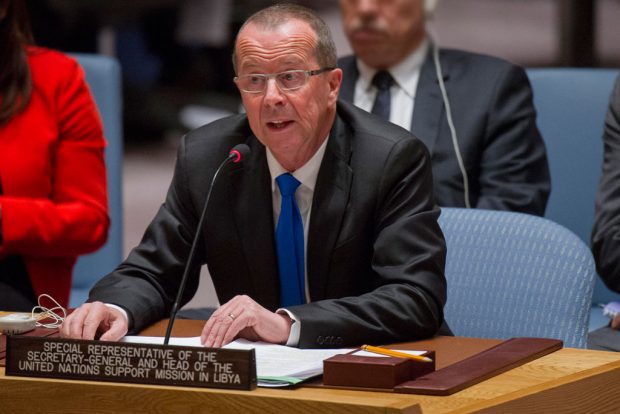Kobler told the UNSC: Alternative to unity in Libya is “chaos”

The UN delegate to Libya, Martin Kobler, on Tuesday reported to the UN Security Council that the implementation of a political agreement in Libya has been stalled, saying that the deal has entered into a stalemate and “much more should have happened.”
The statement came as the special representative of the UN secretary-general for Libya, Martin Kobler, was briefing the UN Security Council just days before the first anniversary of the signing of the Libyan Political Agreement.
“Until today, even the most vociferous critics of the agreement acknowledge that it is the only workable framework,” Kobler said. “That said, the Libyan Political Agreement did not fulfill the expectations. The implementation has stalled.”
“People in Libya are rightly frustrated at the slow pace of progress,” Kobler said.
According to the agreement, the participants in the Libyan dialogue, Tobruk’s House of Representatives and Tripoli’s General National Congress will form a unity government to put an end to the violence and political chaos in Libya.
Kobler stressed the need to tackle outstanding political questions, noting a path forward should consist of inclusive, peaceful dialogue, and never military escalation.
“The only alternative to the Libyan Political Agreement is chaos,” he said.
He further noted that while the fight against terrorism produced results, the gains are not irreversible. The economic recovery of Sirte and Benghazi must therefore be a matter of priority.
The UN envoy said that the issue of human rights and the rule of law, including the situation of migrants, must be more effectively and comprehensively addressed.
“Libya is a human marketplace,” he told the 15-nation UN body. “It is a shame.”
Kobler explained factors such as the limited authority of the Government of National Accord (GNA), the rejection, twice, of the proposed lists of GNA by the Libyan House of Representatives, lack of cooperation between State institutions, “pretender” governments competing for power, and crime and volatile security situation continued to add to the worries in the country.
To conclude an agreement is difficult, to implement it is even more difficult, he said, quoting former South African President Nelson Mandela as saying.
Sounding the alarm, he said the country “continues to be awash” in weapons, and arrivals of new weapons continue unabated, in violation of existing weapons embargo.
“Weapons do not fall from the sky. They come by land or sea,” he said, adding that they sometimes end up in the hands of terrorists throughout the region. As such, he called for strong enforcement of the embargo until Libya has a reliable and coherent security set up.
Meanwhile, Kobler voiced his concern on violent clashes in Tripoli, the Libyan capital, the first since 2014, which was triggered by the killing of a religious scholar, Nadir Al-Omrani, saying that such clashes were symptoms of the lack of security and underlying tensions between communities.
Despite an increase in oil production, the north African country remains in a budget deficit of about 70 percent of its gross domestic product and said that the strained relations between the Presidency Council and the Central Bank further complicated the financial situation, he said.
“Libya’s financial reserves have shrunk from 108 billion (US) dollars in 2013 to 45 billion (US) dollars,” he said. “The country will face an economic meltdown unless something changes.”
He also expressed his concern over the lack of rule of law in the country, rising corruption and high yields on the black market that result in billions of dollars disappearing into illegitimate accounts.
How to submit an Op-Ed: Libyan Express accepts opinion articles on a wide range of topics. Submissions may be sent to oped@libyanexpress.com. Please include ‘Op-Ed’ in the subject line.
- Libya’s HCS invites applicants for key state roles - December 31, 2023
- UK calls on Iran to prevent escalation in Israel-Hamas conflict - November 05, 2023
- Libyan Interior Minister: Immigrant shelter costs a fortune - November 05, 2023


